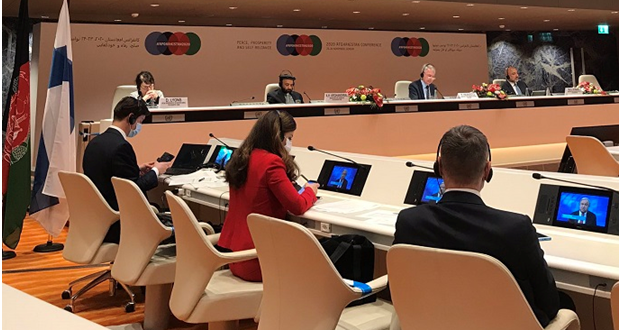A Look to Afghanistan Partnership Framework, 2020 Afghanistan Conference in Geneva
By Wasil Ahmad Akhtar
For the last two decades Afghanistan has been dependent on aid from other countries. The country needs considerable resources to overcome on issues facing in the last five decades.
In past two decades, many conferences were held for the renewal of commitments for reconstruction funds and securing a better future of Afghanistan. The Government of Afghanistan and its International Partners agreed on Afghanistan Partnership Framework (APF) as a result of 2020 Afghanistan Conference, 23-24 November, held in Geneva. Both, the Government of Afghanistan and the International Partners renewed their commitment to continued efforts towards a peaceful, prosperous and self-reliant Afghanistan. The APF is intended for four years starting from 2021, until 2024.
As reported by Daily Finland, the donors pledged at least US$ 3.3 billion for the first year of the upcoming quadrennial, with annual commitments expected to stay at the same level each year. More than 70 countries and 39 organizations and representatives of the civil society participated in 2020 Afghanistan Conference. It is agreed by both the Government of Afghanistan and the International partners that all development assistance will be subject to annual joint review processes to decide upon the level and modality of annual financial support.
Autonomy of action, and transparency and predictability of aid flow is the legitimate interest of international partners. The international partners/donor community have the legitimate concerns regarding effective management and the impact of their financial support. The effective management, joint oversight and annual review process can ensure that the foreign aid is used for its intended purposes and helps promote reforms.
There are several factors experienced that affect the effectiveness of the foreign funding management.
- Ownership of fund flow especially the off-budget assistances and low level of consultations between Government, implementing organizations and donor community;
- Capacity constraints, language, donor and government guideline, in depth understanding of country context and culture;
- Bureaucracy, staff demotivation when coupled with weak oversight has the potential to lead corruption;
- Favored personal gain instead of national interest;
- Un-necessary competition about distribution of resources and improper consideration of vulnerability factors; and
- Lacking consultations especially with citizens as a key beneficiary in general.
Most of the Afghans are living below poverty line and feeling unsecure from all aspects of life. They are either not aware of their rights, do not want to change their lifestyle or feeling unsafe to raise their voice. A country wide public outreach is needed to enhance citizens understanding on their rights, democracy and rules of law in order to advocate citizens and make the government more accountable. The voice of reform concept should come from the people residing in corners for country map. The resources can be effectively utilized and managed if the citizens were engaged fully in especially at the stage of designing reform activities, during and post implementation. The key planning and budgeting should not be made in Kabul but decentralized and extended to the districts and village level where the actual gaps should be tackled.
The Afghanistan Partnership Framework is presented very well that is why the international partners were convinced and renewed their commitments in Geneva Conference but it requires serious attention from the government key figures when it comes to its implementation. Aid could and should produce better results; this was the agreement recognized at the Paris Declaration in 2005, which brought together donor and recipient countries, development institutions, and civil society.
The Government of Afghanistan and International Partners measures should be more transparent and accountable. These measures should be explicitly open to civil society and independent body review, to enhance mutual trust and increase public accountability. Afghanistan should use to the idea that they will receive less or no financial aid after 2024. The aid money will need to be more effective if Afghanistan is to maintain its development path.
In last, if corruption is not meaningfully addressed, donor countries do not support the Afghan government, designing strategies without citizens input, and if not properly utilized then the aid resources spent will not be much effective at all, no matter how well intentioned.
 Afghanistan Times
Afghanistan Times




